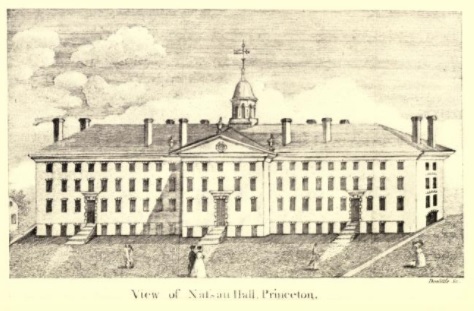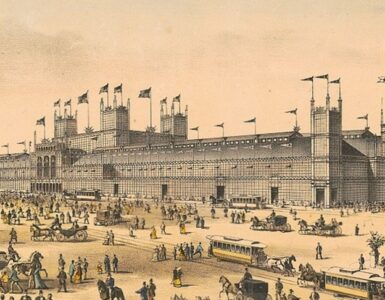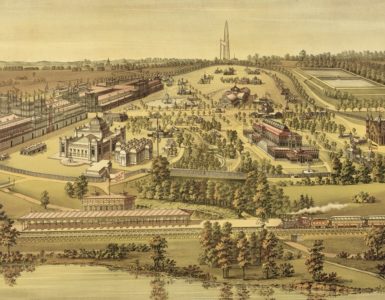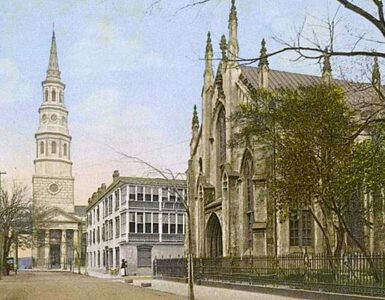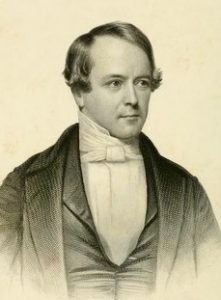 Having passed the annual event known as “spring break” in the world of education, the challenges on the academic calendar that will soon come to pass require burning the midnight oil, but more likely in this day is consuming off-peak watts of electricity. Students have had their rest to prepare for the end of their terms, which means catching up on class readings, writing papers, and studying for examinations. Even those who are good students that have kept up with readings, researched papers, and diligently studied for the inevitable examinations will likely be able to identify with James Alexander’s words from nearly two-hundred years ago.
Having passed the annual event known as “spring break” in the world of education, the challenges on the academic calendar that will soon come to pass require burning the midnight oil, but more likely in this day is consuming off-peak watts of electricity. Students have had their rest to prepare for the end of their terms, which means catching up on class readings, writing papers, and studying for examinations. Even those who are good students that have kept up with readings, researched papers, and diligently studied for the inevitable examinations will likely be able to identify with James Alexander’s words from nearly two-hundred years ago.
At the time of the composition of the following letter, James Alexander was a student in Princeton Seminary. He did not receive his certificate for a three-year program but instead studied for about a year and a half. In the letter, Alexander mentions a trunk that he described as “Waterbury’s,” which refers to its being the property of his roommate, Jared Bell Waterbury (1799-1876). Waterbury went on to pastor Congregational churches in several New England states. Alexander also mentioned study he had accomplished “since tea,” which shows his practice of the afternoon custom enjoyed by many British Americans of his era. He uses the words “farrago,” which means a confused or chaotic mixture, and “foolscap,” which describes a sheet of writing paper measuring about 13 by 6 inches that was commonly used in his day. The addressee of the letter was Alexander’s life-long friend, John Hall, who edited, Forty Years’ Familiar Letters of James W. Alexander, D.D., Constituting, With the Notes, A Memoir of his Life, 2 vols. New York: Charles Scribner, 1860. The letter transcribed here is located on pages 16-17 of volume 1.
THEOLOGICAL SEMINARY, January 30, 1823.
Another month is tapering off to non-entity, and with it closes the first half of our winter term. On Monday next commences a recess from study of two weeks’ duration; and, as you know that feelings of leisure and disenthralment are wont to creep over one before the vacation makes such feelings strictly allowable, you will not be surprised to hear that I am doing nothing about this time. Beware of dreaming that I have nothing to do; for since that unwarrantable boast in my last [letter], that I was almost master of my time, I have been punished for my temerity by an influx of duties innumerable. The “pressure of business” upon me has been so mighty for two or three weeks, that my system has been considerably deranged in its bodily as well as mental parts. When I speak of business, I do not mean to convey to you the impression that my studies, etc., have been the only absorbents of my time, for the pursuits of the class do not necessarily consume many hours of the day; but my mind has been harassed by a multitude of questions in daily agitation, in these metaphysico-theologico-literario walks of science; questions from which I could not in justice to myself turn away my attention, but which have, at the same time, eaten up my vacant hours, and caused a host of unanswered letters to lie in my drawer praying for audience. At the present moment, being 10 o’clock P. M., more or less, I feel fit for no severe exertion; my animal spirits have been sucked up by a difficult Hebrew passage, a difficult mathematical query, and a difficult point in morals since tea, so that I am in a very proper state to utter that farrago of floating ideas commonly called when taken in a body, and put on paper, “A Letter.” These ideas have been swimming in cerebro, I know not how long, crying for enlargement, and I am now arraying them before me on this piece of coarse foolscap, (by the way, the only connecting link between them, so incoherent are they and unsocial).
My roommate left me this evening. I am now sole proprietor of this my little chamber. View me in imagination, seated in my chum’s immense elbow chair, writing by the light of a shaded lamp, heated by a funereal looking stove just before me. Beginning at the south corner of my domicile, you observe first a row of shelves, containing all my little store of books, and many not my own, modestly covered by a gingham veil. In the same corner you may discern my spacious literary throne with all its appendages of drawers, etc. I need not direct your eyes to my scanty stock of chairs. A red desk standing in solemn guise among the sticks of fuel which lie in a capacious box, ready to feed the aforesaid stove. A high stool. A table. A mirror large enough to reflect my haggard features. An assortment of trunks, my own and Waterbury’s. Three maps. A wash stand and appurtenances. A solitary picture to decorate my naked walls. A cluster of pantaloons in suspense. An axe and saw wherewithal our wood is cut. And finally (though not least precious) near to my room mate’s couch is placed my lowly cot, into which wearied nature bids me presently creep. Pardon the vagaries of a half-crazed student. Good-bye, for this night.
Dorm rooms have not changed that much in that they are most often utilitarian, simple, and provide few distractions to interfere with their occupants’ studies. Instead of a wood-burning stove there is now central air and heat, the bin full of wood for the stove has been replaced by cleaner and safer fuels, natural fibers and real wood finishes have been superseded by synthetics and laminates, and instead of an inkwell, dip pen, and a stack of papers there is a digital device of some sort for reference, correspondence, reading, and writing.
J. W. Alexander was an intelligent man and one might think he cruised through school on brain power alone, but it is clear that he had to study and was weary from the long hours. Learning requires effort, planning, diligence, and patience, which may be attributes among current students that are increasingly becoming hard to find. So, as you enter your studies for the remainder of the term, remember solitary James Alexander in his cubicle nearly two-hundred years ago meticulously wrestling with Hebrew despite being thoroughly fatigued.
Barry Waugh
Notes–The header is Nassau Hall at Princeton University. As the deadline for another post on Presbyterians of the Past approached, the author suffered from a severe case of indecisiveness regarding its subject. After researching three topics and abandoning them all, Wayne Sparkman of the PCA Historical Center graciously told me about this letter for my use. For a sermon by J. W. Alexander’s father, Archibald, on Presbyterians of the Past see, “The Incarnation of Christ, Archibald Alexander“; and a brief biogaphy of his brother J. A. Alexander is available at “J. Addison Alexander, Linguistic Genius.”


